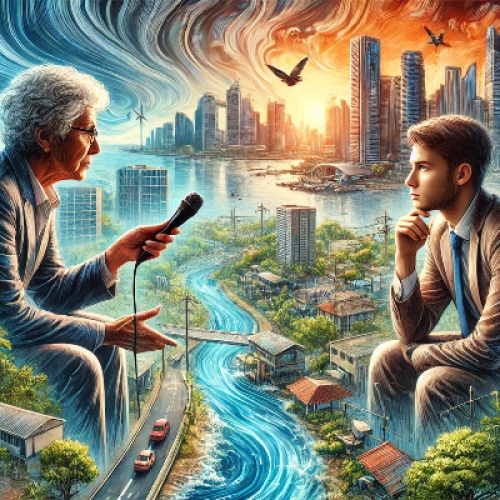In 2021, I sat down with RJ, a well-spoken and thoughtful local resident, to discuss some of the pressing social and environmental challenges facing our city, our nation, and the world. What unfolded was a conversation that not only reflected the gravity of our shared problems but also offered a sobering look at the systemic changes needed to address them. Now, at the close of 2024, RJ's words resonate more deeply as many of these challenges have only intensified.
Significant Issues in Our City
When asked about the most pressing social issues confronting our city, RJ pointed first to a sobering truth: "Without a city, there's no issues to solve." Coastal erosion and land subsidence were his top concerns. As a low-lying coastal community, our city faces existential threats from these environmental forces.
"The state of our infrastructure comes next," he added. RJ highlighted the crumbling water system, unreliable electrical grid, and inefficient waste management. These issues, while mundane on the surface, are symptoms of deeper neglect and underinvestment in public services.
Lastly, he pointed to poverty, a systemic issue that affects thousands of residents daily. "People are living without basic necessities," he emphasized. This widespread deprivation exacerbates other social challenges, creating a cycle that's hard to break.
Environmental Concerns at the Local Level
Turning to environmental issues, RJ's concerns mirrored his earlier points. Coastal erosion and land loss remained central, but he also noted how rising temperatures worsen living conditions. "The way the heat is exacerbated by global warming - especially in neighborhoods without tree cover - is a serious problem," he said.
Pollution and littering were additional concerns. RJ detailed how runoff from urban areas enters local waterways, damaging aquatic ecosystems and threatening estuaries and fisheries critical to both our environment and economy.
A Broader Perspective on Global Issues
Zooming out to global issues, RJ expressed frustration at the sheer scale of problems. From global warming and plastic pollution to factory farming and deforestation, he painted a grim picture of humanity's environmental footprint.
Socially, he pointed to deep injustices: human rights abuses in countries like China, the oppression of women and children under Sharia law in Afghanistan, and generational genocides across Asia and Africa. Closer to home, RJ noted how racism, wealth inequality, and a lack of access to clean water still plague the world's most developed nations.
"The world is burning," RJ said bluntly. "And humans have done it."
A Call for Systemic Change
When asked what issues he felt most invested in, RJ emphasized the environment, healthcare, and education. "Everybody deserves clean air, clean water, and healthy food," he said. Access to healthcare and quality education were equally vital in his view. "No one should have to declare bankruptcy because of a medical bill. And education is the foundation for a better future."
Addressing these problems, however, isn't simple. RJ argued that it requires a "mass shift in consciousness." He acknowledged the importance of individual action but stressed the need for systemic change.
"There are a hundred corporations responsible for 75% of the world's pollution," he said. "We can all recycle, but unless policies change and businesses are held accountable, individual efforts will feel futile."
The Path Forward
As our conversation wound down, RJ reflected on what it would take to make meaningful progress. "It's not just one law," he said. "It's a rewriting of laws, constitutional amendments, better enforcement of existing regulations, and a fundamental shift in how we approach life and our place in the world."
He cited a 2021 UN report warning of irreversible climate change unless urgent action was taken. At the time, the message seemed bleak. Now, as the world grapples with record-breaking heat waves, unprecedented flooding, and other climate disasters, RJ's words feel prophetic.
Despite his candid realism, RJ ended our discussion with a spark of hope. "Nothing's impossible. If you believe in yourself, you can make a difference. Addressing these issues is the only way to make the world more sustainable."
As we approach 2025, RJ's challenge to prioritize long-term solutions over short-term profits is more critical than ever. The problems are vast, but as RJ reminded me three years ago, "No one can solve the world's problems alone. The only way to solve them is to address them, together."
Significant Issues in Our City
When asked about the most pressing social issues confronting our city, RJ pointed first to a sobering truth: "Without a city, there's no issues to solve." Coastal erosion and land subsidence were his top concerns. As a low-lying coastal community, our city faces existential threats from these environmental forces.
"The state of our infrastructure comes next," he added. RJ highlighted the crumbling water system, unreliable electrical grid, and inefficient waste management. These issues, while mundane on the surface, are symptoms of deeper neglect and underinvestment in public services.
Lastly, he pointed to poverty, a systemic issue that affects thousands of residents daily. "People are living without basic necessities," he emphasized. This widespread deprivation exacerbates other social challenges, creating a cycle that's hard to break.
Environmental Concerns at the Local Level
Turning to environmental issues, RJ's concerns mirrored his earlier points. Coastal erosion and land loss remained central, but he also noted how rising temperatures worsen living conditions. "The way the heat is exacerbated by global warming - especially in neighborhoods without tree cover - is a serious problem," he said.
Pollution and littering were additional concerns. RJ detailed how runoff from urban areas enters local waterways, damaging aquatic ecosystems and threatening estuaries and fisheries critical to both our environment and economy.
A Broader Perspective on Global Issues
Zooming out to global issues, RJ expressed frustration at the sheer scale of problems. From global warming and plastic pollution to factory farming and deforestation, he painted a grim picture of humanity's environmental footprint.
Socially, he pointed to deep injustices: human rights abuses in countries like China, the oppression of women and children under Sharia law in Afghanistan, and generational genocides across Asia and Africa. Closer to home, RJ noted how racism, wealth inequality, and a lack of access to clean water still plague the world's most developed nations.
"The world is burning," RJ said bluntly. "And humans have done it."
A Call for Systemic Change
When asked what issues he felt most invested in, RJ emphasized the environment, healthcare, and education. "Everybody deserves clean air, clean water, and healthy food," he said. Access to healthcare and quality education were equally vital in his view. "No one should have to declare bankruptcy because of a medical bill. And education is the foundation for a better future."
Addressing these problems, however, isn't simple. RJ argued that it requires a "mass shift in consciousness." He acknowledged the importance of individual action but stressed the need for systemic change.
"There are a hundred corporations responsible for 75% of the world's pollution," he said. "We can all recycle, but unless policies change and businesses are held accountable, individual efforts will feel futile."
The Path Forward
As our conversation wound down, RJ reflected on what it would take to make meaningful progress. "It's not just one law," he said. "It's a rewriting of laws, constitutional amendments, better enforcement of existing regulations, and a fundamental shift in how we approach life and our place in the world."
He cited a 2021 UN report warning of irreversible climate change unless urgent action was taken. At the time, the message seemed bleak. Now, as the world grapples with record-breaking heat waves, unprecedented flooding, and other climate disasters, RJ's words feel prophetic.
Despite his candid realism, RJ ended our discussion with a spark of hope. "Nothing's impossible. If you believe in yourself, you can make a difference. Addressing these issues is the only way to make the world more sustainable."
As we approach 2025, RJ's challenge to prioritize long-term solutions over short-term profits is more critical than ever. The problems are vast, but as RJ reminded me three years ago, "No one can solve the world's problems alone. The only way to solve them is to address them, together."






